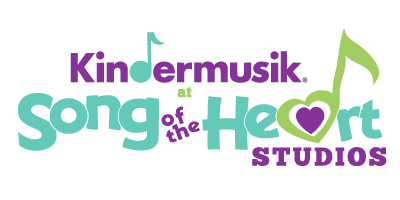Have you noticed the AMAZING collection of puppets we use at Song of the Heart? We find that puppets always add a splash of excitement and an extra layer of enjoyment during our classes. We often look for new and different puppets that we can add to our collection to add variety and value to our classes for you.
Not only have our puppets been a beloved part of our in-person classes, they have been invaluable props during our virtual classes the last several months. Nothing quite beats the excitement in a child’s eyes when they see a giant whale appear on the screen, or maybe a parrot, or a princess, or a donkey, or a monkey!
Puppets are a whole lot of fun, but they are actually an important developmental and pedagogical tool as well. Puppets can have incredible benefits in a child’s early development. Here are a few:
Language Development
A shy child who is uncomfortable using their voice may be more confident in letting the puppet be their voice. They can practice using their voice and making different sounds when it’s the puppet speaking, and not them. Even if a child isn’t shy, they will automatically be inspired to try out new phonemes and blended sounds as their imagination sparks and they make their puppet speak.
Social Development
That shy child may be uncomfortable interacting with their teacher or classmates. Sometimes children are even unsure when interacting with their own immediate family members. But pull out a puppet, and they instantly have a safe and nonthreatening companion to interact with.
Emotional Development
It can be difficult to find words for our feelings. It’s a challenge even for grown ups to express, find validation, and process difficult emotions. A person may not feel comfortable talking about their feelings to another person, parent, friend, or teacher. But that nonthreatening puppet can be a friend that’s much easier to talk to. This is why Mr. Rogers, virtual childhood educator extraordinaire, used puppets so extensively. Through puppet play he was able to show children how to process challenging experiences and make sense of the world.
Listening Skills
A child may not listen to their mother or teacher, but pull out a puppet and just watch their attention change. This magic Mr. Rogers understood, which is why he built an entire Neighborhood of Make Believe. Acting lessons out through puppet play prompted the children to pay attention, truly listen, and learn.
Fine Motor Skills
We love our classroom finger puppets! It’s such a delightful way for a child to practice moving their fingers individually, pulling a puppet on and off, switching fingers, and more. It’s great for coordination, control, and dexterity. This will have long-term benefits as they learn to play instruments, type, and write.
Creativity & Imagination
A child with a puppet naturally creates new scenarios, acts out behaviors, makes new sounds, and has new conversations. They automatically flex their storymaking skills, which is fundamental to learning sequencing, an essential pre-reading skill. Not to mention just learning through exploration as they create new ways of playing with their puppets and scaffold new skills upon that puppet.
We wish we could all be sharing our puppet library together right now, but you can still benefit from puppet play at home. Grab an old sock or a paper bag, some glue, yarn, crayons, markers, pipe cleaners, felt, etc. Let your imagination run wild as you and your little one create and make your own puppet pals.
We’d love to see what you create! If you make a puppet with your child, please snap a photo and tag us on social media! Have fun with those puppets!

